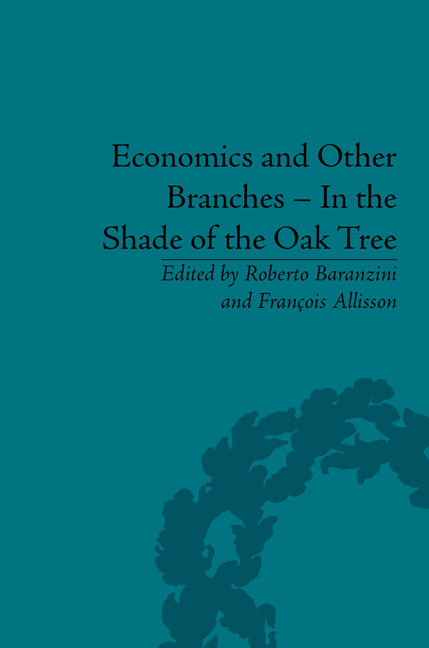Book contents
- Frontmatter
- CONTENTS
- List of Contributors
- List of Figures and Tables
- Introduction
- Pascal Bridel's Bibliography (up to 2013)
- Part I Léon Walras's Economic Thought
- Part II The Spreading of Thought
- Léon Walras's Reception
- The Lausanne School
- French Matters
- Cambridge UK
- Part III Monetary Theory
- Part IV Methodology
- Part V Economics and Humanities
- Economics and Social Sciences
- Some Insights from Visual Arts
- 26 Imaginative Intelligence: Cognition in the Visual Arts versus Rationality in Economics
- 27 Realism and Reality: The Arguments of Cinema
- Part VI Economics and Civil Society
- Notes
- Index
26 - Imaginative Intelligence: Cognition in the Visual Arts versus Rationality in Economics
from Some Insights from Visual Arts
- Frontmatter
- CONTENTS
- List of Contributors
- List of Figures and Tables
- Introduction
- Pascal Bridel's Bibliography (up to 2013)
- Part I Léon Walras's Economic Thought
- Part II The Spreading of Thought
- Léon Walras's Reception
- The Lausanne School
- French Matters
- Cambridge UK
- Part III Monetary Theory
- Part IV Methodology
- Part V Economics and Humanities
- Economics and Social Sciences
- Some Insights from Visual Arts
- 26 Imaginative Intelligence: Cognition in the Visual Arts versus Rationality in Economics
- 27 Realism and Reality: The Arguments of Cinema
- Part VI Economics and Civil Society
- Notes
- Index
Summary
Olympian Rationality, Adaptive Routines and Bounded Rationality
Markets work through networks of information flows, thanks to which people define contracts of exchanges and implement allocative choices. Understanding the way markets work means conceiving the cognitive capabilities which people use when they cooperate or compete in production and exchange. Both intellectual and relational capabilities are required, including attitudes pertaining to the sphere of behaviour related to ‘sympathy’. In considering cognitive aspects in economic activity, a minimum requirement should be to look at the multiple sides of intelligence explored by scholars in psychology. In economic theory the focus was primarily on intellectual capabilities in ‘rational choice’. Since the nineteenth century, in economics ‘rationality’ was conceived along three modelling strategies, which we broadly distinguish under the labels of perfect rationality, adaptive rationality and bounded rationality. They embody different views of how the mind works, when people deal with economic affairs, though they may partially overlap, calling into question the complexity or consistency of the architecture of cognition, which different economists propose.
The label ‘perfect’ rationality is here adopted to indicate the highest normative standard of rationality, also named ‘substantive’ rationality, or ‘Olympian’ rationality in Simon's definition. Perfect rationality postulates the best cognitive abilities in conceiving stable and coherent preference orderings, and in computing optimal solutions, applying well-defined optimizing procedures within given constraints, and on comprehensive data sets.
- Type
- Chapter
- Information
- Economics and Other Branches – In the Shade of the Oak TreeEssays in Honour of Pascal Bridel, pp. 363 - 382Publisher: Pickering & ChattoFirst published in: 2014



